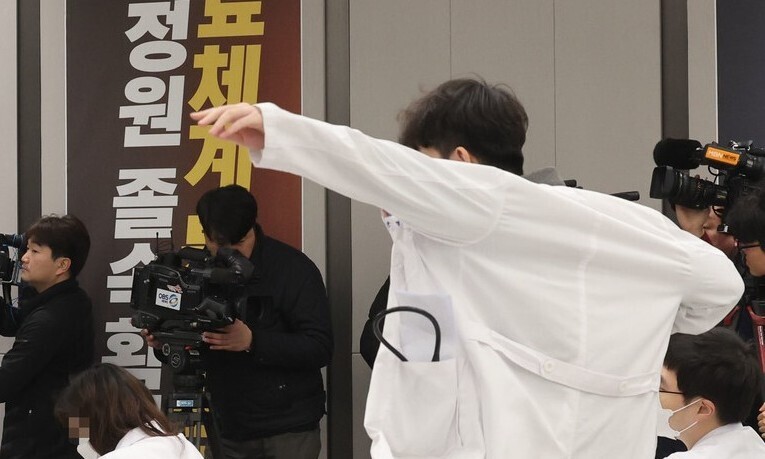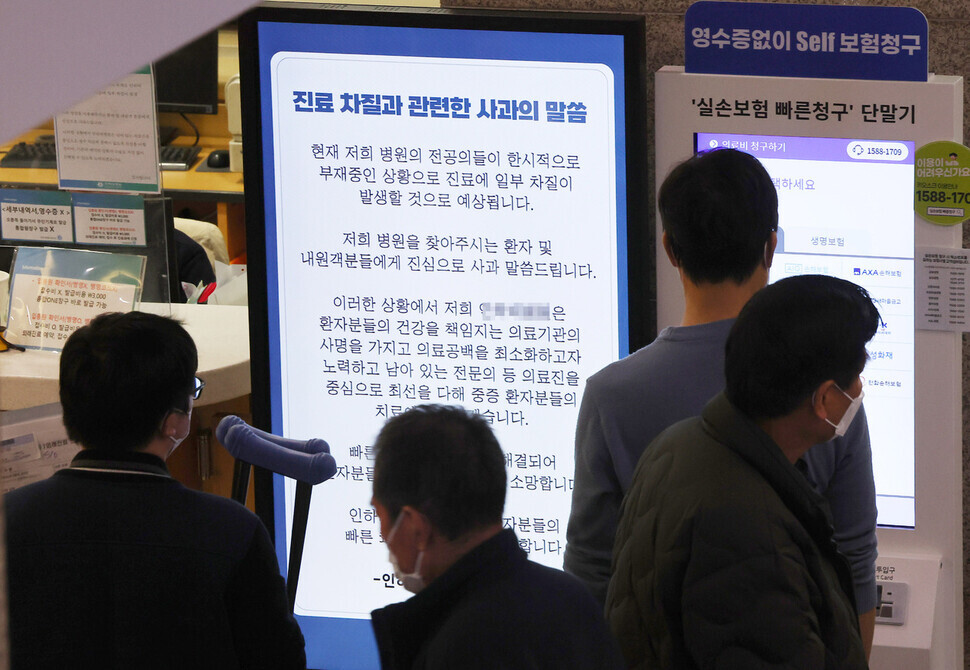hankyoreh
Links to other country sites 다른 나라 사이트 링크
Korea says it will seek arrest warrants for doctors who don’t return to work

The South Korean government warned that medical interns and residents who are taking part in collective action in opposition to the government’s plan to raise the cap on admissions at the country’s medical schools could face arrest warrants and criminal investigations. Notably, the authorities also said they will seek to detain trainee doctors and leaders who are organizing collective action despite the government’s order for trainees to return to work.
“There’s no justification for collective action that jeopardizes the people’s lives and safety. If the trainees continue their collective refusal to treat patients, they will be sternly investigated in accordance with related laws, including the Medical Service Act and the Criminal Act,” said Minister of the Interior and Safety Lee Sang-min in a briefing by a government task force at the main government complex in Seoul on Wednesday.
Government officials believe that striking interns and residents could be charged with interfering with business under the Criminal Act and with various violations of the Medical Service Act and the Fair Trade Act. Other senior officials at the press conference included Justice Minister Park Sung-jae, Police Commissioner General Yoon Hee-keun, and Shin Ja-yong, a senior prosecutor at the Supreme Prosecutors’ Office.
The government has taken an unyielding stance on the trainee doctors’ collective action, describing it as “illegal.” Justice Minister Park Sung-jae even promised to “fully mobilize investigative resources.” The officials also threatened to sternly punish not only trainee doctors taking part in the collective action but also “anyone egging them on or pulling the strings.”
“We will also take appropriate legal action against hospital administrators who condone the formation of a vacuum in our medical care system by neglecting their duty to prevent or resolve collective action,” Park said.
“There will be severe consequences for groups behind the scenes that have been providing financial assistance to trainee doctors and encouraging them to strike and submit collective resignations,” Park said in an apparent reference to the Korean Medical Association, which has organized a fundraiser to raise money for those participating in the collective action.

Significantly, the government said that trainee doctors who lead collective action or who refuse to obey the government’s back-to-work order will be prosecuted for obstruction of normal medical care and the resumption of that care. The government also said it would seek to detain such individuals during the course of criminal investigations.
“As a rule, individual trainee doctors who refuse to return to work will be formally indicted and placed on trial,” Park said.
Park added that if trainee doctors’ collective action causes harm to patients’ lives and health, the authorities will “explore all available legal methods for holding them responsible to the greatest possible extent.”
That said, the government said it plans to show leniency to trainee doctors who take part in collective action but quickly return to the job, under Korea’s system of suspending indictments.
The government also promised to provide patients and families who have been harmed by the trainee doctors’ collective action with legal advice and litigation assistance through the Korea Legal Aid Corporation, local attorneys, and a legal assistance program for marginalized residents known as the “legal home doctor” system.
The government also declared that the argument made by some that the trainee doctors’ collective action is not a strike but individual resignations reflects a misunderstanding of the law.
Yoon Hee-keun, the head of the national police, said that this claim, which was being made by medical lobby groups, was not a valid legal interpretation. “Law enforcement will handle that according to the relevant laws, including the Medical Service Act,” he said.
As for trainee doctors who are attempting to avoid service of the back-to-work order through such methods as deactivating their mobile phones and going into hiding, the Ministry of Health and Welfare and law enforcement agencies plan to explore legally valid ways of serving the order.
Thus far, Korea’s emergency phone line (112) has not received any reports of patients dealing with deteriorating health or being denied transportation because of the trainee doctors’ collective action.
“There have been posts online urging people to delete patients’ records, and we’re currently tracking down the posters,” Yoon said.
“We received criminal complaints today about the chairperson and leaders of the emergency executive committees of the Korea Interns and Residents Association and the Korea Association of Medical Colleges, which are organizing the collective action,” he added.
By Park Da-hae, staff reporter
Please direct questions or comments to [english@hani.co.kr]

Editorial・opinion
![[Column] Welcome to the president’s pity party [Column] Welcome to the president’s pity party](https://flexible.img.hani.co.kr/flexible/normal/500/300/imgdb/original/2024/0515/3917157400447943.jpg) [Column] Welcome to the president’s pity party
[Column] Welcome to the president’s pity party![[Editorial] Korea must respond firmly to Japan’s attempt to usurp Line [Editorial] Korea must respond firmly to Japan’s attempt to usurp Line](https://flexible.img.hani.co.kr/flexible/normal/500/300/imgdb/original/2024/0514/2317156736305813.jpg) [Editorial] Korea must respond firmly to Japan’s attempt to usurp Line
[Editorial] Korea must respond firmly to Japan’s attempt to usurp Line- [Editorial] Transfers of prosecutors investigating Korea’s first lady send chilling message
- [Column] Will Seoul’s ties with Moscow really recover on their own?
- [Column] Samsung’s ‘lost decade’ and Lee Jae-yong’s mismatched chopsticks
- [Correspondent’s column] The real reason the US is worried about Chinese ‘overcapacity’
- [Editorial] Yoon’s gesture at communication only highlights his reluctance to change
- [Editorial] Perilous stakes of Trump’s rhetoric around US troop pullout from Korea
- [Guest essay] Preventing Korean Peninsula from becoming front line of new cold war
- [Column] The state is back — but is it in business?
Most viewed articles
- 1[Column] Welcome to the president’s pity party
- 2Could Korea’s Naver lose control of Line to Japan?
- 3Naver’s union calls for action from government over possible Japanese buyout of Line
- 4US has always pulled troops from Korea unilaterally — is Yoon prepared for it to happen again?
- 5[Editorial] Korea must respond firmly to Japan’s attempt to usurp Line
- 6Major personnel shuffle reassigns prosecutors leading investigations into Korea’s first lady
- 7[Editorial] Transfers of prosecutors investigating Korea’s first lady send chilling message
- 8[Column] Will Seoul’s ties with Moscow really recover on their own?
- 9[Correspondent’s column] The real reason the US is worried about Chinese ‘overcapacity’
- 10Extended deterrence for S. Korea admits North Korea’s de facto status as a nuclear state